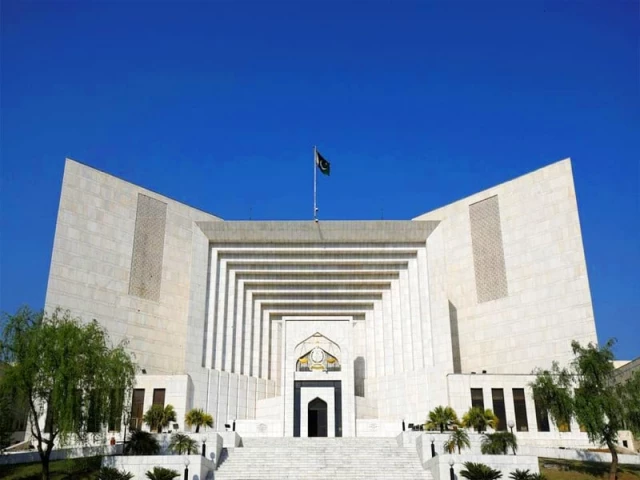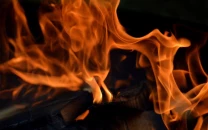SC judge cautions regular benches on jurisdiction
Justice Mazhar says only CB can interpret law and Constitution after 26th Amendment

Supreme Court Justice Muhammad Ali Mazhar has warned regular benches not to exercise jurisdiction in matters related to the interpretation of law and the Constitution that fall within the domain of the Constitutional Bench under Article 191A of the Constitution.
"With all humility at my command and with due reverence, if any regular bench, despite the clear and unambiguous constitutional provisions, over-ambitiously assumes jurisdiction or undertakes to decide the alleged controversy based solely on the respondent's counsel's argument in a tax matter without self-realization, it would not only constitute a wrongful exercise of jurisdiction but also amount to a violation of Article 191A of the Constitution.
"Judges have taken an oath to preserve, protect, and defend the Constitution. Moreover, the Code of Conduct for Judges of the Supreme Court and High Courts, framed by the Supreme Judicial Council under Article 128 (4) of the Constitution of the Republic of Pakistan, 1962 ("1962 Constitution") and subsequently amended under Article 209 (8) of the Constitution of the Islamic Republic of Pakistan, 1973, implies complete submission to the Constitution and, under it, to the law," said a 20-page judgment authored by Justice Mazhar while agreeing the constitutional bench's decision wherein regular bench's two judicial orders were recalled.
A three-judge bench of the apex court, led by Justice Syed Mansoor Ali Shah had passed interim orders for the adjudication of legal question as whether regular benches could be barred to hear the matters related to the interpretation of law and Constitution under Article 191A of the Constitution.
Despite judicial orders, the committee of constitutional bench had withdrawn the case from the regular bench and same was fixed before the constitutional bench. Later, the Constitutional Bench led by Justice Aminuddin Khan also recalled those orders.
However, the constitutional bench did not give a reason as to how the committee could withdraw the case in violation of judicial order.
Justice Mazhar noted that in the current scenario, no bench of this court, except the constitutional bench, can exercise: (i) the original jurisdiction of the Supreme Court under Article 184; (ii) the appellate jurisdiction of the Supreme Court under clause (3) of Article 185, where a judgment or order of a high court passed under Article 199 involves the constitutionality of any law or a substantial question of law regarding the interpretation of the Constitution; and (iii) the advisory jurisdiction of the Supreme Court under Article 186.
The exactitude of clause (5) of Article 191A dictates that all petitions, appeals, or review applications against judgments rendered or orders passed, to which clause (3) applies, pending or filed in the Supreme Court prior to commencement of the 26th Amendment forthwith stand transferred to the Constitutional Benches and shall only be heard and decided by Benches constituted under clause (4).
The phrase "forthwith stand transferred" is explicit and well-articulated, leaving no room for any misunderstanding or bewilderment. This phrase cannot be equated with a mere deeming clause that establishes a legal fiction by treating something as if it were different from its actual state or declaring that certain facts are to be taken as established", said Justice Mazhar.
Regarding the role of two committees working under Supreme Court Practice and Procedure Act 2023, the SC judge said that two different committees" demonstrate that the first Committee, under section 2, is responsible for handling and fixing cases before this Court (regular benches) other than those falling within clause (3) of Article 191A of the Constitution.
"In contrast, the Committee under Section 2A has been vested with jurisdiction to determine whether a case falls within clause (3) of Article 191A. If it does, it should be heard by the Constitutional Bench; if not, it may be referred to the Committee constituted under Section 2 for fixation and disposal by another bench. One important aspect that cannot be overlooked is that both Committees are provided for under the Act. However, the second Committee is also protected under clause (4) of Article 191A of the Constitution, a recognition not accorded to the first Committee."
The SC judge also said that it is also clear beyond any shadow of doubt that both Committees have been assigned distinct roles and responsibilities, with neither overlapping nor overriding the jurisdictional boundaries of the other, except for the common factor that the most senior judge of the constitutional bench is also an ex-officio member of the committee constituted under section 2 of the Practice and Procedure Act.
"Presently, if a case falls within clause (3) of Article 191A of the Constitution, the first Committee has no jurisdiction to fix such a case before a regular bench. The wrongful fixation of a case meant for the Constitutional Bench before a Regular Bench, or vice versa, does not create or expand jurisdiction, as the clear distinction has already been established under Article 191A of the Constitution. This supreme law is not subservient and docile to the rules or judicial orders passed under any misconception regarding case fixation."
Justice Mazhar also said that instead of taking cognizance or assuming jurisdiction or passing any judicial order for fixation, the best course of action would have been to refer the matter to the Committee constituted under Section 2 of the Practice and Procedure Act.
"Had the Committee found the matter beyond the jurisdiction of a regular bench, it could have referred to the Committee formed for the determination of whether a matter is to be sent to the Constitutional Bench. Even said Committee on its own motion may refer the matter to the Committee of Constitutional Benches for consideration. On the face of it, the matter was wrongly or inadvertently fixed by the office, leading to the regular bench taking cognizance of a jurisdictional issue that is already well-defined and expressed in the plain language of the Constitution.
"Under the dictates of the present scheme of the Constitution, the judges in the Constitutional Benches of the Supreme Court may be nominated from time to time, as may be determined by the Judicial Commission of Pakistan, with the rider that such a Bench may comprise equal number of Judges from each Province.
"It is also a matter of record that following the introduction of constitutional amendments and the constitution of the Constitutional Bench, the Regular Benches and the Constitutional Bench, through mutual cooperation, and being two branches of one tree, transferred cases between them for hearing in accordance with their respective jurisdictions, as demarcated under the present constitutional scheme."
Justice Mazhar said that according to the sub-section (2) of section 2A of the Practice and Procedure Act, the Registrar of the Supreme Court is obligated to provide the requisite administrative and sectorial support to the Constitutional Benches.
"This provision, in my opinion, accentuates the role of the Registrar's office including the fixture branch, in assisting the second committee in determining jurisdiction through a speaking order, if a case does not fall within the jurisdiction of the Constitutional Bench, it may then be referred to the Committee constituted for deciding the fixation of case before the regular benches of this Court. In my view, while letting bygones be bygones, some due diligence measures are now imperative in order to provide effective administrative and sectoral support, therefore, the Registrar must take all reasonable precautions to prevent mistakes
or oversights in case fixation and concerned branch/officials may be sensitized the nitty-gritties of Article 191A of the Constitution so that they may not commit any such mistake or misadventure in future.
"The recklessness or inadvertence of concerned officials has created an unwarranted situation, leading to misunderstandings without just cause. Therefore, I propose (subject to the approval of the Honorable Chief Justice of this Court) that a "Case Management System" be developed with the support of the Information Technology (I.T.) department of this Court. This system should ensure proper case segregation, provide a thumbnail sketch of each case and its relief sought, and incorporate "pop up reminders" or "alerts" that appear on every computer screen of the fixture branch and the Registrar to facilitate a final verification before cause lists are released to avoid any advertent or inadvertent mistakes or slip-ups. To further ensure accuracy, meticulous vetting of all cases should be conducted by the Registrar's office, with both hard and soft copies compiled and regularly presented before the Committee constituted for the Constitutional Bench. These lists must incorporate the key features of each case, and in support of such lists and notes, the original files should also be available for administrative review. Additionally, a "Printed Form" template should be introduced, requiring the AOR/ASC to indicate the nature of each case and its appropriate jurisdiction at the time of filing. This would be particularly helpful at the initial stage. In case of any remaining confusion, case files may be put up by the Registrar before the relevant Committee for a preliminary jurisdictional determination" Justice Mazhar.
"The Constitutional Bench, on 28.01.2025, rightly recalled the Orders dated 13.01.2025 and 16.01.2025, passed by the Regular Bench of this Court, being without jurisdiction and obviously on recalling such orders, the superstructure built thereon also collapsed, thus, any proceedings taken, orders passed, or actions made in pursuance of the aforesaid orders lose their status and effect", he concluded.



















COMMENTS
Comments are moderated and generally will be posted if they are on-topic and not abusive.
For more information, please see our Comments FAQ